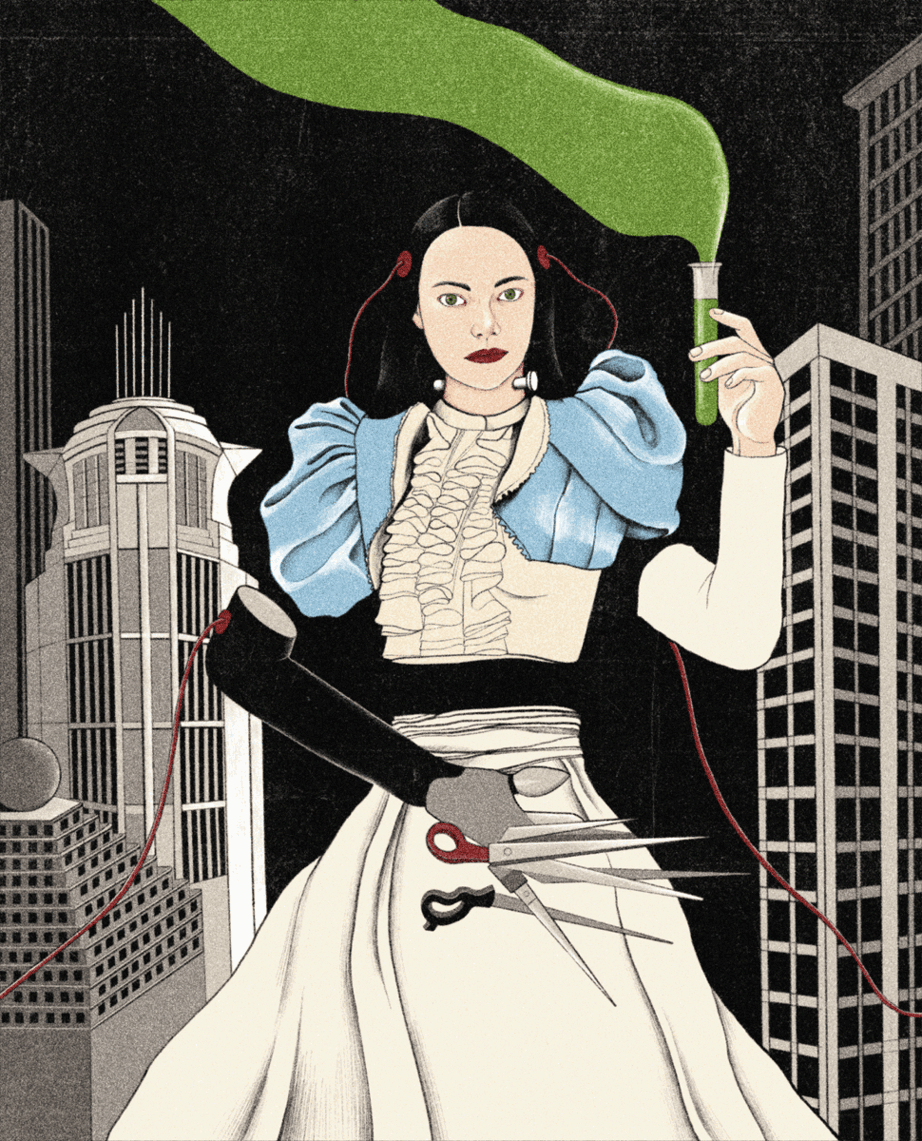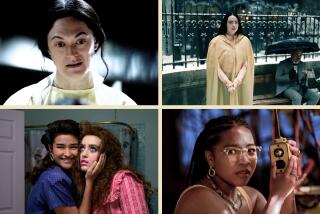‘Frankissstein’ author Jeanette Winterson gives new life to the monster
- Share via
If anyone can revivify the Frankenstein story, it’s adventurous, prize-winning British writer Jeanette Winterson.
Frankenstein’s monster has been part of our culture for more than 200 years — Mary Shelley’s book was published in 1818. In 1931, Universal made the classic films with Boris Karloff, giving the story cinematic momentum. Then came Mel Brooks’ satire and countless TV, film, comic and literary appearances and reinterpretations. And, of course, you can dress as a Sexy Frankenstein‘s monster for Halloween. You might think the Frankenstein myth is played out.
Not Winterson. “What Mary Shelley’s book can teach us is really huge,” she said in a phone interview in advance of her U.S. book tour, which brings her to Los Angeles on Sunday for the first time in years. “This is like a message in a bottle that has been waiting for us across time, waiting for the right people to find it who would read it very differently.”
Advanced technologies are combining to propel us into a Frankenstein-inflected future, she said. “We’re the first generation who will soon share the planet with a self-created life form. Not made out of the discarded rotting parts of the graveyard, but out of the 0s and 1s of code.”
In her new novel “Frankissstein,” Winterson intertwines two narratives. One goes back to the source, fully imagining Mary Shelley as she creates her famous novel, begun during a legendary holiday with husband Percy Shelley and their friend Lord Byron. The other is in the near-future, following a transgender medical doctor who collaborates with a pioneer in artificial intelligence that explores cryonics, the singularity and sexbots.
Winterson is acclaimed in England, where she was named a CBE last year (a rare honor, Commander of the Most Excellent Order of the British Empire is the last step before rising to the level of Knight or Dame). She is known for her wit, intelligence and progressive writing about sexuality. “Oranges Are Not the Only Fruit,” her 1985 debut, has become a classic of lesbian literature; she’s published two dozen works of fiction and nonfiction, including “Sexing the Cherry” and “Written on the Body.”
Benjamin Moser, author of the new biography “Sontag,” said Winterson’s work is especially significant. “Novels like ‘Oranges are not the Only Fruit’ and ‘Written on The Body’ have been mentioned to me time and again as great moments in their readers’ lives — their intellectual lives, their emotional lives, their writerly lives.” he said. “Winterson might be the most expansive, the most ambitious, the most wide-ranging of all out lesbian writers.”
“Frankissstein” is intellectually bracing and sexually explicit; a historical literary romp and a futuristic thriller. It, like its characters, rejects the binary.
The modern story riffs on the original — the AI theorist is Prof. Victor Stein — while also ripping apart its structure. Stein is not at work on a single creation but following several paths at once into a post-human future. The focus is not on his process but his ideas; he thinks like Ray Kurzweil and gives lectures both public and private, mostly to Dr. Shelley.
Stein lectures, “The nearby world of AI will be a world where the physical limits of our bodies will be irrelevant. Robots will manage much of what humans manage today. Intelligence — perhaps even consciousness — will no longer be dependent on a body. We will learn to share the planet with non-biological life forms created by us.”
From the audience, Shelley thinks, “I’m watching him as he talks. I love watching him. He has that sex-mix of soul-saving and erudition. His body is lean and keen … Women adore him. Men admire him.”
Dr. Ry Shelley presents as male and identifies as trans, specifying that they live in doubleness. “I wanted to put a trans character in there, and that was important to me. If people don’t like the depiction, obviously that’s their choice, and I’ll be able to hear that. But I feel that Ry is a positive person,” Winterson said. As a character, Shelley serves as our protagonist, leading us into Stein’s world.
In this remixed narrative, Winterson bends history and story, letting the fictional character interact with its creator. They even become romantically involved — hence, the XXX on the cover.
“With the sex, I wanted the sex to be sexy when it was good,” Winterson said. “And I wanted it to be terrifying in the attempted rape scene.” That takes place in America, where a violent man suddenly assaults Shelley. “I have friends who are trans, and myself, growing up gay, getting beaten up, getting threatened, is part of normal life. I wanted to put that in to show what it’s like to find yourself in that situation.”
While the book is full of Stein’s optimistic vision for a technologically enhanced future, it also threads through this cord of darkness, which Winterson sees as essentially human.
“That’s the human dream,” she tells me. “That’s what we are. We are devils and angels. We invent things — we split the atom and what do we do? We make a bomb. We’re ready to wipe out all the life on this planet. And at the same time we’re capable of such beauty.”
Although Winterson’s book is part centuries-old Gothic fiction and part futuristic science fiction, she’s also bracingly engaged in the present moment. She discussed data bias, Stephen King, the dangers of social media, climate change (she uses “climate breakdown”) and Brexit (this paper can’t print the words she uses for Brexit).
“We are made up of layers of time. We move chronologically — as we must, we have no choice — but our imaginative life, our emotional life, our mental life, doesn’t move in straight lines. It moves more like a boomerang,” she said. “You know, the thing keeps coming back and back. Things you were, places you were, who you were, it just returns to you.”
This idea is reflected in “Frankissstein,” not just as a project but in its structure, in the relationship between her characters. They boomerang between past and future, across fiction and history, returning and remaking gender and identity.
Yet it’s also about how we read, and why we return to stories like the one Mary Shelley published 201 years ago. “When we are reading, we return to or access emotional and imaginative states that we have known,” Winterson said. “This is very beneficial, it’s nourishing, it’s as though things are not lost to us, they can be returned.”
Info: Jeanette Winterson reads from “Frankissstein” at 5 p.m. Sunday at Skylight Books, 1818 N. Vermont Ave., Los Angeles.
Kellogg is a former books editor of The Times.
More to Read
Sign up for our Book Club newsletter
Get the latest news, events and more from the Los Angeles Times Book Club, and help us get L.A. reading and talking.
You may occasionally receive promotional content from the Los Angeles Times.










